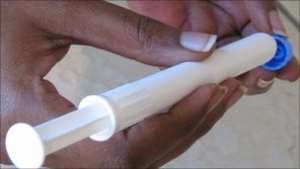
A vaginal gel has significantly cut the rate of women contracting HIV from infected partners in an experiment in South Africa, researchers said.
They said the gel, containing Aids drug tenofovir, cut infection rates among 889 women by 50% after one year of use, and by 39% after two and a half years.
If the results are confirmed it would be the first time that a microbicidal gel has been shown to be effective.
Such a gel could be a defence for women whose partners refuse to wear condoms.
New ways of curbing the spread of HIV are badly needed, particularly in sub-Saharan Africa, where nearly 60% of those infected with the virus are women.
Many women are often forced to take part in unsafe sex, and are biologically more vulnerable to HIV infection than men, making a gel they apply an attractive option.
Welcoming the results, UN agencies said they would convene an expert consultation in South Africa next month to discuss the next steps with the product.
'Just pennies'
The results of the three-year study, which was completed by the Centre for the Aids Programme of Research in South Africa (Caprisa), are being presented at an international aids conference in Vienna and were published on Monday by the US magazine Science.
The gel was found to be both safe and acceptable when used once in the 12 hours before sex and once in the 12 hours after sex by women aged 18 to 40 years.
Salim Abdool Karim, one of the two leading co-researchers, told reporters in Vienna that the 889 women involved in the trial, conducted in the coastal city of Durban and a remote rural village, had largely used the gel as directed.
They were also given condoms and advice about sexually transmitted diseases, and tested for HIV once a month.
After 30 months, 98 women became infected with HIV - 38 in the group that got tenofovir in the gel and 60 in the group that got placebos.
"We showed a 39% lower incidence of HIV in the tenofovir group," Dr Karim said.
Tenofovir, he added, lowered the risk of infection by 50% at 12 months but then the efficacy declined.
Women who used the gel more consistently were much less likely to be infected, he said.
He added that he did not know how much each dose would cost but said the applicators and gel cost "just pennies".
"Boy, have we been doing the happy dance," Dr Karim, from the University of KwaZulu-Natal in Durban, said.
'Hope for women'
"It's the first time we've ever seen any microbicide give a positive result that you could say was statistically significant," said Dr Anthony Fauci, director of the National Institute of Allergy and Infectious Diseases.




 Akufo-Addo spotted ordering chiefs to stand for his handshake
Akufo-Addo spotted ordering chiefs to stand for his handshake
 Akufo-Addo ‘disrespects’ every chief in Ghana except Okyenhene — NDC Communicato...
Akufo-Addo ‘disrespects’ every chief in Ghana except Okyenhene — NDC Communicato...
 Supreme Court clears way for dual citizens to hold key public positions
Supreme Court clears way for dual citizens to hold key public positions
 Be transparent, don’t suppress the truth – Prof. Opoku-Agyemang to Jean Mensa
Be transparent, don’t suppress the truth – Prof. Opoku-Agyemang to Jean Mensa
 ‘I won’t tell the world I was only a driver’s mate during challenges’ – Prof Jan...
‘I won’t tell the world I was only a driver’s mate during challenges’ – Prof Jan...
 We’ll prosecute corrupt officials of Akufo-Addo’s govt – Prof Jane Naana
We’ll prosecute corrupt officials of Akufo-Addo’s govt – Prof Jane Naana
 [Full text] Acceptance speech by Prof Jane Naana Opoku-Agyemang as 2024 NDC Runn...
[Full text] Acceptance speech by Prof Jane Naana Opoku-Agyemang as 2024 NDC Runn...
 Election 2024: Don’t be complacent, we haven’t won yet – Asiedu Nketia cautions ...
Election 2024: Don’t be complacent, we haven’t won yet – Asiedu Nketia cautions ...
 Election 2024: Stop fighting over positions in Mahama’s next govt – Asiedu Nketi...
Election 2024: Stop fighting over positions in Mahama’s next govt – Asiedu Nketi...
 Prof Jane Naana Opoku-Agyemang will restore dignity of vice presidency – Fifi Kw...
Prof Jane Naana Opoku-Agyemang will restore dignity of vice presidency – Fifi Kw...
